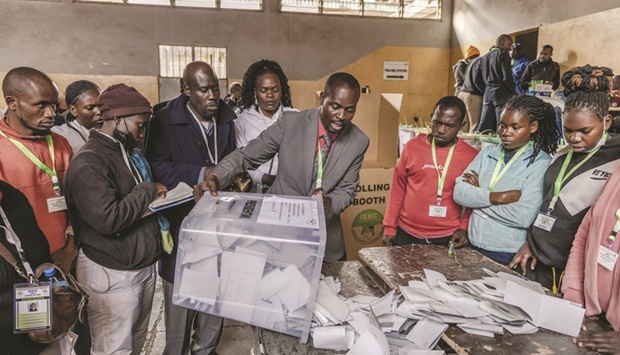Kenya yesterday voted for a new president against a backdrop of economic hardship and growing disenchantment with the political elite, with voting largely peaceful but producing low turnout in some areas.
The country is hoping for an orderly transition of power after almost a decade under two-term President Uhuru Kenyatta, but concerns about vote-rigging linger after past election disputes triggered deadly unrest.
Deputy president and erstwhile heir-apparent William Ruto, 55, is running against Raila Odinga, the 77-year-old veteran opposition leader now backed by long-time rival Kenyatta after a stunning shift in allegiances.
Voters lined up well before dawn to cast their ballots in what has been billed as a key test for democracy in a country where ordinary people have become frustrated with political leaders and their failure to deliver on their promises.
By 4pm (1300GMT), 10 hours after polling began, turnout was at just over 56% of the 22mn registered voters, according to the Independent Electoral and Boundaries Commission (IEBC). Comparable figures for the August 2017 election were not immediately available but overall turnout then reached 78%.
Polls closed at 5pm (1400GMT), with some stations reporting sparse turnout as they shut their doors.
Others continued to host queues of waiting voters while polling stations whose opening was delayed stayed open until later.
“Those of them on the queue, all of them will vote - no-one will be turned away,” said Sylvia Amoni, an election officer in a central district of Nairobi.
Many people said they hoped this year’s vote would make their lives easier as they struggle to put food on the table amid soaring inflation and a crippling drought.
“I have come to vote to pick someone who bring change to this country,” said unemployed 34-year-old Ruth Iminza in the Nairobi slum of Kibera. “Everything has gone up including school fees for our children.”
Pressure is on the IEBC to ensure a free and fair vote in all six polls — for the presidency as well as for senators, governors, lawmakers, woman representatives and some 1,500 county officials.
The IEBC acknowledged that about 200 electronic voter registration devices had failed, out of a total of more than 46,000.
Polling was suspended in Wajir, a county bordering Somalia, after a gunfight left election officials trapped inside an office where ballots were stored, the IEBC said.
Police also fired tear gas after youths blocked a road with burning tyres in western Nakuru county after a local vote was suspended.
No presidential election outcome has gone uncontested since 2002, and there will be an anxious wait for this year’s results which are not expected for several days.
Analysts have suggested that Odinga, a onetime political prisoner and former prime minister who is making his fifth stab at the presidency, could edge past his younger rival.
If neither wins more than 50%, Kenya will stage a run-off for the first time in its history.
Ruto has painted the election as a battle between ordinary “hustlers” and “dynasties” — the Kenyatta and Odinga families that have dominated Kenyan politics since independence from Britain in 1963.
Since neither man belongs to the dominant Kikuyu tribe, which has produced three of the country’s four presidents, the election will open a new chapter in Kenya’s history.
If Odinga wins, his running mate Martha Karua - a Kikuyu - would become deputy president, the first woman to hold the post.
Kenya’s international partners are closely watching the vote in a country deemed a beacon of regional stability.
Both Odinga and Ruto have urged a peaceful election, but fears remain that if the loser challenges the outcome - as widely expected - there could be unrest.
Security was tight, with more than 150,000 officers deployed across the country of about 50mn.

An electoral commission official proceeds to count votes after the official closing of polls during Kenya’s general election at Mathare Social Hall in Nairobi, Kenya, yesterday.
